Eat more dark chocolate!
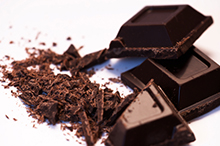 Regular readers of this column probably know that dark chocolate (Theobroma cacao) contains flavonoids that improve blood flow through the arteries. That’s why daily consumption of dark chocolate (not milk chocolate, which has low levels of flavonoids) is associated with reduced risk of heart disease, stroke, and high blood pressure. Dark chocolate also improves blood flow through the arteries of the brain, which has led one team of researchers to find out if this favorite food has any impact on learning and emotions.
Regular readers of this column probably know that dark chocolate (Theobroma cacao) contains flavonoids that improve blood flow through the arteries. That’s why daily consumption of dark chocolate (not milk chocolate, which has low levels of flavonoids) is associated with reduced risk of heart disease, stroke, and high blood pressure. Dark chocolate also improves blood flow through the arteries of the brain, which has led one team of researchers to find out if this favorite food has any impact on learning and emotions.
The Australian-British study, published in the online version of the Journal of Psychopharmacology, looked at 30 healthy college students. On each of three days, these subjects consumed one of three beverages containing different amounts – 994 mg, 520 mg, or 46 mg (the control) – of cocoa flavonoids. Each participant consumed each beverage with three-day washout period between drinks. Before and after consumption of each beverage, subjects took standard psychological tests that measured anxiety, mood, and cognitive function. Cocoa flavonoids had no effect on anxiety, but the two higher doses significantly elevated mood and improved cognitive processing speed.
The amounts of cocoa flavonoids found helpful are equivalent to a few ounces of dark chocolate. So, if you’re looking for another excuse to indulge, here it is: Dark chocolate makes you happy – and perhaps even smart!
Turmeric and rose hips for arthritis
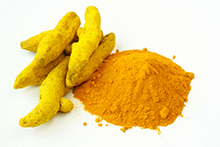 Mounting evidence shows that both rose hips (Rosa canina) and curcumin, the yellow pigment in the Indian spice turmeric (Curcuma longa), have anti-inflammatory action that helps treat the joint pain and stiffness of osteoarthritis, the leading cause of chronic pain.
Mounting evidence shows that both rose hips (Rosa canina) and curcumin, the yellow pigment in the Indian spice turmeric (Curcuma longa), have anti-inflammatory action that helps treat the joint pain and stiffness of osteoarthritis, the leading cause of chronic pain.
The latest report on curcumin comes from Greek researchers who have 50 people with arthritic knees assessment of joint pain and a treadmill test to see how far the subjects could walk before knee pain become severe. The researchers then gave the participants curcumin (the equivalent of 200 mg/ day of powdered herb).
After three months, the participants retook the tests. The survey also showed a significant decrease in knee pain, and the distance the subjects were able to walk pain-free increased from 76 to 332 meters, a very sizeable difference. In addition, the curcumin treatment allowed participants to reduce mainstream arthritic medication, which reduced their stomach distress and improved their quality of life.
Meanwhile, Scandinavian scientists decided to conduct a metaanalysis of previous research focusing on rose hips and their ability of reduce arthritis pain. The team identified the three most rigorous studies, which involved 306 people with osteoarthritis of the knee, average age of 66, who took either a placebo or rose-hip powder for at least three months. Based on standard before-and-after tests of knee pain, rose hips seem to have reduced knee pain substantially (66 present). In addition, while taking the herb, participants were able to reduce the amount of medication they took.
If you have osteoarthritis, you probably take a nonsteroidal anti-inflammatory drug (NSAID). There’s no question that NSAIDs relieve joint pain, but they can also cause severe stomach distress. Based on these studies, you might give curcumin and rose hips a try to relieve mild to moderate osteoarthritis pain. For more severe arthritis pain, the two herbs may allow you to at least reduce your NSAID dose. Talk to you doctor about it.
Bacopa and memory
Native to India, bacopa (Bacopa monnieri), a spreading, marsh dwelling groundcover with delicate white flowers, is now an ornamental that grows all aover the temperate world. Bacopa also has a long history in Ayurvedic medicine as a mind stimulant and memory enhancer, and several studies have backed this traditional use.
The latest report on bacopa, comes from Australian researchers, who recruited 98 older adults, average age of 65, who showed no symptoms of dementia and depression, and who consumed less than four alcoholic drinks per day. Participants took standard cognitive function and memory tests, and then received either a placebo or bacopa (300 mg /day). After 12 weeks, the bacopa group showed significantly improved memory.
This study, published in the Journal of Alternative and Complementary Medicine, confirms bacopa’s traditional use an a memory herb, and several earlier studies of its effectiveness. Bacopa is not among the most popular herbal medicines, so small health-food stores may not stock it. Look for it in larger stores or online from a reputable source.
Protect Your Aging Brain
with “Yummy” Berries.
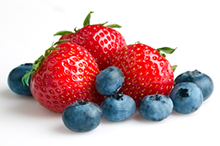 Berries in our breakfast cereal or yogurt topping may be doing more than merely adding fruity flavor to our day. A “bunch” of new research suggests that blueberries, strawberries, grapes and other berry fruits could help protect our brain from decline with aging.
Berries in our breakfast cereal or yogurt topping may be doing more than merely adding fruity flavor to our day. A “bunch” of new research suggests that blueberries, strawberries, grapes and other berry fruits could help protect our brain from decline with aging.
In addition to their now well-known antioxidant effects, dietary supplementation with berry fruits also has direct effects on the brain. Intake of these fruits may help to prevent age-related neurodegeneration and resulting changes in cognitive and motor function.
Some of the latest research focuses on beneficial effects of berry fruits on the ways that neurons in the brain communicate. By boosting the brain’s signaling functions, berries may prevent damaging inflammation in the brain and protect cognition and motor control.
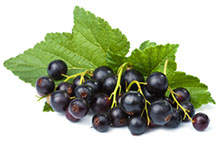 At least some of berries’ protective power appears to derive from antioxidant flavonoid compounds called anthocyanins, which give the fruits their vivid red, purple and blue colors. These anthocyanins are found in berry fruits including blueberries, strawberries, raspberries, blackberries, bilberries, huckleberries and cranberries, as well as grapes and currants.(Journal of Agricultural and Food Chemistry, online first)
At least some of berries’ protective power appears to derive from antioxidant flavonoid compounds called anthocyanins, which give the fruits their vivid red, purple and blue colors. These anthocyanins are found in berry fruits including blueberries, strawberries, raspberries, blackberries, bilberries, huckleberries and cranberries, as well as grapes and currants.(Journal of Agricultural and Food Chemistry, online first)
The case for berries’ brain benefits was also recently bolstered by a study published in Annals of Neurology, scientists found that women who consumed two or more half-cap servings of strawberries or one or more half-cap of blueberries per week saw slower mental decline- equivalent to up to two and a half years of delayed cognitive aging. Intakes of anthocyanins and total flavonoids were also associated with slower cognitive aging. (Annals of Neurology,online first)
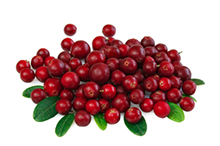 Berries may also be good for our blood vessels, according to laboratory tests in Finland. Researchers fed lingonberry, cranberry and blackcurrant juice to rats specially bred to develop high blood pressure. All three juices were associated with reductions in compounds linked to inflammation. Lingonberry juice was also linked to significant improvements in biomarkers associated with damage to cells thougt to contribute to atherosclerosis. The positive effects can’t be linked to a single phenolic compound in the juices, scientists noted, although several such antioxidant compounds have been shown to have anti-inflammatory benefits. Overall, researchers concluded that “lingonberry juice appears to be the most effective of the tested juices”(Journal of Functional Foods, April 2012)
Berries may also be good for our blood vessels, according to laboratory tests in Finland. Researchers fed lingonberry, cranberry and blackcurrant juice to rats specially bred to develop high blood pressure. All three juices were associated with reductions in compounds linked to inflammation. Lingonberry juice was also linked to significant improvements in biomarkers associated with damage to cells thougt to contribute to atherosclerosis. The positive effects can’t be linked to a single phenolic compound in the juices, scientists noted, although several such antioxidant compounds have been shown to have anti-inflammatory benefits. Overall, researchers concluded that “lingonberry juice appears to be the most effective of the tested juices”(Journal of Functional Foods, April 2012)
